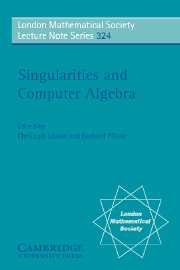Book contents
- Frontmatter
- Contents
- Preface
- Invited Lectures
- List of Participants
- Aspects of Gert-Martin Greuel's Mathematical Work
- Exterior Algebra Methods for the Construction of Rational Surfaces in the Projective Fourspace
- Superisolated Surface Singularities
- Linear Free Divisors and Quiver Representations
- Derived Categories of Modules and Coherent Sheaves
- Monodromy
- Algorithmic Resolution of Singularities
- Newton Polyhedra of Discriminants: A Computation
- Depth and Differential Forms
- The Geometry of the Versal Deformation
- 21 Years of SINGULAR Experiments in Mathematics
- The Patchworking Construction in Tropical Enumerative Geometry
- Adjunction Conditions for One-Forms on Surfaces in Projective Three-Space
- Sextic Surfaces with Ten Triple Points
- Sextic Surfaces with 10 Triple Points
- Topology, Geometry, and Equations of Normal Surface Singularities
Derived Categories of Modules and Coherent Sheaves
Published online by Cambridge University Press: 11 November 2009
- Frontmatter
- Contents
- Preface
- Invited Lectures
- List of Participants
- Aspects of Gert-Martin Greuel's Mathematical Work
- Exterior Algebra Methods for the Construction of Rational Surfaces in the Projective Fourspace
- Superisolated Surface Singularities
- Linear Free Divisors and Quiver Representations
- Derived Categories of Modules and Coherent Sheaves
- Monodromy
- Algorithmic Resolution of Singularities
- Newton Polyhedra of Discriminants: A Computation
- Depth and Differential Forms
- The Geometry of the Versal Deformation
- 21 Years of SINGULAR Experiments in Mathematics
- The Patchworking Construction in Tropical Enumerative Geometry
- Adjunction Conditions for One-Forms on Surfaces in Projective Three-Space
- Sextic Surfaces with Ten Triple Points
- Sextic Surfaces with 10 Triple Points
- Topology, Geometry, and Equations of Normal Surface Singularities
Summary
Abstract
We present recent results on derived categories of modules and coherent sheaves, namely, tame–wild dichotomy and semi-continuity theorem for derived categories over finite dimensional algebras, as well as explicit calculations for derived categories of modules over nodal rings and of coherent sheaves over projective configurations of types A and Ã.
This paper is a survey of some recent results on the structure of derived categories obtained by the author in collaboration with Viktor Bekkert and Igor Burban [6, 11, 12]. The origin of this research was the study of Cohen–Macaulay modules and vector bundles by Gert-Martin Greuel and myself [27, 28, 29, 30] and some ideas from the work of Huisgen-Zimmermann and Saorín [42]. Namely, I understood that the technique of “matrix problems,” briefly explained below in subsection 2.3, could be successfully applied to the calculations in derived categories, almost in the same way as it was used in the representation theory of finite-dimensional algebras, in study of Cohen–Macaulay modules, etc. The first step in this direction was the semi-continuity theorem for derived categories [26] presented in subsection 2.1. Then Bekkert and I proved the tame–wild dichotomy for derived categories over finite dimensional algebras (see subsection 2.2). At the same time, Burban and I described the indecomposable objects in the derived categories over nodal rings (see Section 3) and projective configurations of types A and à (see Section 4).
Information
- Type
- Chapter
- Information
- Singularities and Computer Algebra , pp. 79 - 128Publisher: Cambridge University PressPrint publication year: 2006
Accessibility standard: Unknown
Why this information is here
This section outlines the accessibility features of this content - including support for screen readers, full keyboard navigation and high-contrast display options. This may not be relevant for you.Accessibility Information
- 1
- Cited by
